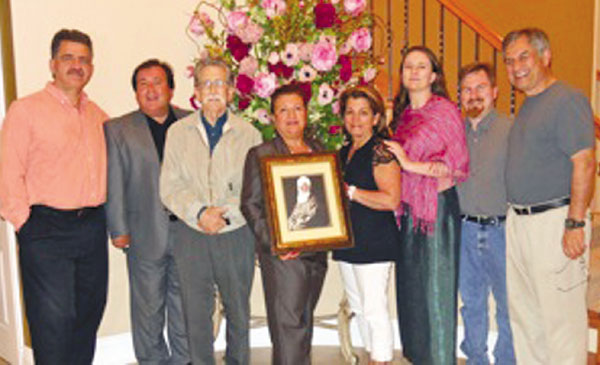
The world’s religious faiths differ sharply in their systems of
governance. While some are highly autocratic with orders coming
from the top down, others are very democratic. A good example of
the latter is the Baha’i faith.
The world’s religious faiths differ sharply in their systems of governance. While some are highly autocratic with orders coming from the top down, others are very democratic. A good example of the latter is the Baha’i faith.
On April 20, the Baha’is of Gilroy joined the international Baha’i community of five million members living in 189 countries and 46 territories to celebrate the festival of Ridvan, designated by Baha’u’llah, the Prophet Founder of the Baha’i Faith as “the King of Festivals” and elected their nine-member governing council called the Local Spiritual Assembly for 2011-2012.
Like Judaism and Islam, the Baha’i faith days begin at sunset on the previous solar day and end at sunset of the present solar day.
So, although the Festival of Ridvan starts on April 21, the followers of the Baha’i Faith celebrate it at sunset on April 20.
From April 21 to May 2, Baha’is celebrate this festival to commemorate the anniversary of Baha’u’llah’s public declaration in 1863 that Baha’u’llah was God’s messenger for this age, the latest in a line of divine teachers (like Jesus, Mohammad, Buddha, Krishna, Moses, Zoroaster and others) and the Promised One of all earlier religions.
When he was banished from his native Iran to Acre, a penal city in Ottoman Palestine, (now Israel), he spent 40 years of exile and persecution.
On his way, he stayed 12 days in a garden outside Baghdad, visiting with his followers, who named the garden “Ridvan,” which means “Paradise” in Arabic. Bahá’u’lláh then specified the first, ninth and twelfth days to be holy days. Baha’is suspend work, and students do not go to school on these days.
Currently, the three holy days are usually observed with a gathering where prayers are shared then followed by a celebration.
The central theme of Prophet Bahá’u’lláh’s message is that “humanity is one single race and that the day has come for its unification in one global society.”
God, Bahá’u’lláh said, has set in motion historical forces that are breaking down traditional barriers of race, class, creed and nation and that will, in time, give birth to a universal civilization.
“The principal challenge facing the peoples of the earth is to accept the fact of their oneness and to assist the processes of unification.”
There are no clergy in the Baha’i faith. “Because the human race has entered upon the age of its maturity, each individual is able to explore the revelation of God and to decide on the issues of life through prayer, reflection, and consultation with others.” To make this possible, the Baha’i scriptures have so far been translated into some 800 different languages.
The same principle applies to the community’s collective life.
Approximately 11,000 elected councils, called “Spiritual Assemblies,” administer the affairs of the faith at both local and national levels around the world. All adult believers are equally eligible, and election is by secret ballot. The work of the faith is entirely supported by voluntary contributions from the members.
Giving to the Baha’i fund is regarded as one of the privileges of membership; the faith does not accept outside contributions.
The joy of this occasion that should have been shared by Baha’i members, however, was marred by recent news that the Iranian high court re-imposed harsher sentences on seven Baha’i leaders held in Iran’s notorious Gohardasht Prison.
This latest action by Iran’s judiciary overturned a September 2010, decision by an appellate court that had replaced the seven leaders’ original prison sentences of 20 years with 10-year terms.
While the lower court’s ruling revoked three charges of espionage, collaboration with Israel and providing classified documents to foreign nationals to undermine state security, it still convicted the seven of, essentially, fulfilling their former roles as members of an ad hoc leadership group tending to the basic needs of the 300,000-member Baha’i community in Iran.
The imprisonment of the Bahá’í leaders and the reinstatement of their sentences have provoked a worldwide chorus of condemnation from governments and human rights organizations.
This is the latest example of persecutions that the Baha’is in Iran have suffered during the past 30 years. More than 200 Baha’is have been killed, hundreds more imprisoned and thousands deprived of jobs, education and the freedom to worship.
For more information about local Baha’i events, contact Public Information Officer Frank Azad at (408) 310-7685. Other information is available at www.bahai.us.









